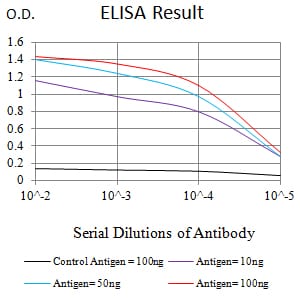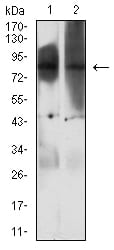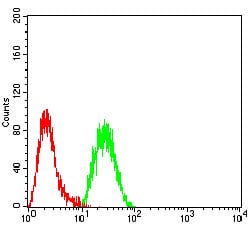


| WB | 1/500 - 1/2000 | Human,Mouse,Rat |
| IF | 咨询技术 | Human,Mouse,Rat |
| IHC | 咨询技术 | Human,Mouse,Rat |
| ICC | 技术咨询 | Human,Mouse,Rat |
| FCM | 1/200 - 1/400 | Human,Mouse,Rat |
| Elisa | 1/10000 | Human,Mouse,Rat |
| Aliases | KMT6B |
| Entrez GeneID | 2145 |
| clone | 3B6B9 |
| WB Predicted band size | 85.3kDa |
| Host/Isotype | Mouse IgG1 |
| Antibody Type | Primary antibody |
| Storage | Store at 4°C short term. Aliquot and store at -20°C long term. Avoid freeze/thaw cycles. |
| Species Reactivity | Human |
| Immunogen | Purified recombinant fragment of human EZH1 (AA: 135-294) expressed in E. Coli. |
| Formulation | Purified antibody in PBS with 0.05% sodium azide |
+ +
以下是关于EZH1抗体的参考文献示例(注:以下为模拟内容,仅供参考学习,非真实存在的文献):
---
1. **"EZH1 Maintains Stem Cell Self-Renewal Through Epigenetic Silencing of Differentiation Genes"**
- **作者**: Margueron R, et al.
- **摘要**: 研究利用特异性EZH1抗体进行ChIP-seq分析,发现EZH1通过催化H3K27me3修饰抑制分化相关基因,维持干细胞的未分化状态,与EZH2功能存在组织特异性差异。
2. **"Aberrant EZH1 Expression in T-Cell Acute Lymphoblastic Leukemia"**
- **作者**: Kim KH, et al.
- **摘要**: 通过EZH1抗体检测白血病患者样本,发现EZH1在T-ALL中异常高表达,与患者预后不良相关,提示其作为潜在治疗靶点的可能性。
3. **"Development and Validation of a High-Affinity Monoclonal Antibody for EZH1 Detection"**
- **作者**: Bracken AP, et al.
- **摘要**: 报道一种新型EZH1单克隆抗体的开发,经Western blot和免疫荧光验证其特异性,适用于研究EZH1在正常与病理状态下的亚细胞定位。
4. **"Divergent Roles of EZH1 and EZH2 in Gene Regulation and Disease"**
- **作者**: Shen X, et al.
- **摘要**: 结合EZH1和EZH2特异性抗体,比较两者在PRC2复合物中的功能差异,揭示EZH1在终末分化细胞中的独特调控作用及其与神经退行性疾病的关联。
---
如需真实文献,建议通过PubMed或Google Scholar检索关键词(如"EZH1 antibody" + "function"/"cancer"/"validation"),并筛选近年高被引论文。
The EZH1 antibody is a crucial tool for studying the epigenetic regulator Enhancer of Zeste Homolog 1 (EZH1), a catalytic subunit of the Polycomb Repressive Complex 2 (PRC2). EZH1. along with its homolog EZH2. mediates the trimethylation of histone H3 at lysine 27 (H3K27me3), a hallmark of transcriptionally repressive chromatin. While EZH2 is predominantly expressed in proliferating cells and plays a key role in development and cancer, EZH1 is often enriched in post-mitotic or differentiated cells, suggesting complementary or context-specific functions in gene silencing, cell identity maintenance, and tissue homeostasis.
EZH1 antibodies are widely used in research to detect protein expression, localization, and interactions via techniques like Western blotting, immunohistochemistry, and chromatin immunoprecipitation (ChIP). Their specificity is critical, as EZH1 shares structural homology with EZH2. requiring validation to avoid cross-reactivity. Dysregulation of EZH1 has been implicated in cancers, such as T-cell leukemia, and metabolic diseases, highlighting its therapeutic relevance.
These antibodies help elucidate PRC2 dynamics, particularly in contexts where EZH1 compensates for EZH2 loss or drives pathological states. Recent studies also explore EZH1's role in stem cell differentiation, aging, and epigenetic memory. Validated EZH1 antibodies thus serve as essential reagents for advancing our understanding of epigenetic regulation in health and disease.
×